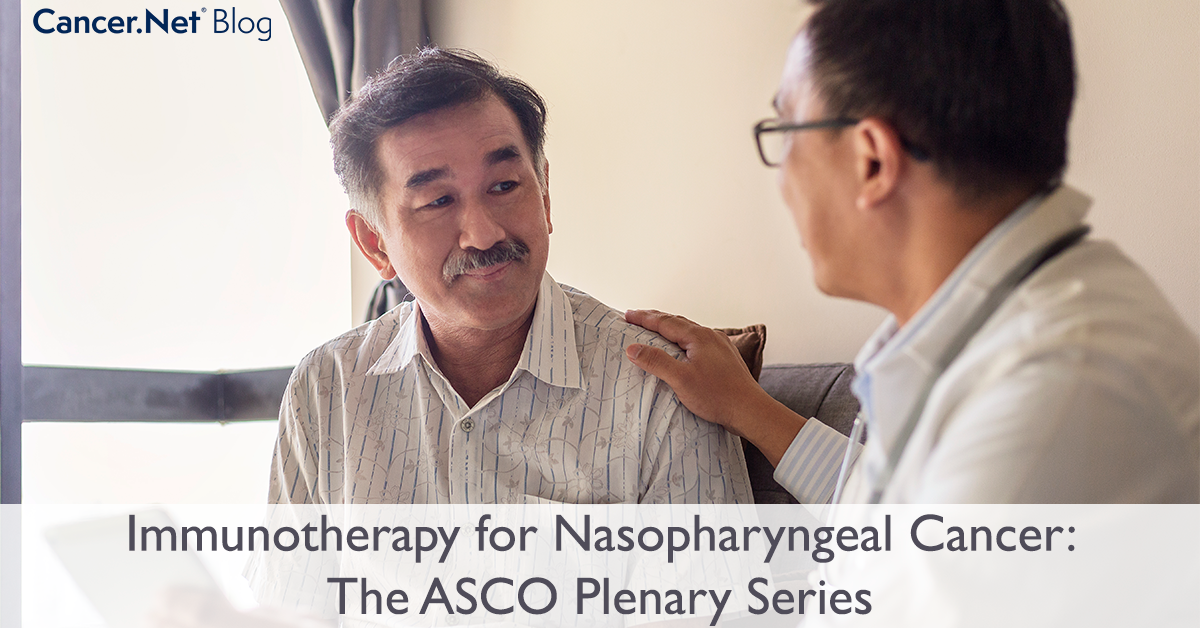
The pace of progress in cancer research keeps getting faster and faster. However, the results of this research can take time to reach the medical community. The ASCO Plenary Series is a program developed by the American Society of Clinical Oncology (ASCO) to help speed the delivery of high-impact cancer research. In this series, cancer care providers gather online to learn about new, carefully selected research and discuss the study results with their colleagues.
The April 2022 session in the ASCO Plenary Series features a study on a new treatment for recurrent or metastatic nasopharyngeal cancer.
- Tislelizumab combined with chemotherapy helps people with advanced nasopharyngeal cancer live longer
Follow the discussion about research from the ASCO Plenary Series by using the #ASCOPlenarySeries hashtag on Twitter.
Tislelizumab combined with chemotherapy helps people with advanced nasopharyngeal cancer live longer
Who does this study affect: People with recurrent or metastatic nasopharyngeal cancer, which is a type of head and neck cancer.
What did this study find: A clinical trial called RATIONALE-309 studied whether tislelizumab combined with chemotherapy helped people with recurrent or metastatic nasopharyngeal cancer live longer. Tislelizumab is a type of immunotherapy called a PD-1 inhibitor. Immunotherapy is a type of cancer treatment that boosts the body’s natural defenses to fight cancer.
Nasopharyngeal cancer is uncommon in the United States but more common in certain parts of North Africa, the Middle East, and Asia, particularly southeast China. This cancer starts in the nasopharynx, which is the air passage between the nose and the throat and lungs. The standard treatment for people with recurrent or metastatic nasopharyngeal cancer is a combination of chemotherapy using gemcitabine (Gemzar) and cisplatin (available as a generic drug). Tislelizumab is approved in China to treat other types of cancer.
This study included 263 people with recurrent or metastatic nasopharyngeal cancer. The patients were mostly men, with a median age of 50 years. The median is the midpoint, so half the participants were older than 50 and the other half were younger than 50. The participants were divided into 2 groups. In the first group, 131 patients received tislelizumab plus gemcitabine and cisplatin. The other group of 132 patients received the same 2 chemotherapy drugs along with a placebo. Participants in the second group were allowed to switch to the group receiving tislelizumab if their cancer worsened.
At the point when the data were analyzed, the researchers found that those receiving tislelizumab and chemotherapy had their cancer stopped for a median of 9.6 months, compared to 7.4 months for those who did not receive the immunotherapy drug. This means that the study participants who received tislelizumab had 50% less risk that their cancer would grow at any time point, compared with those who did not receive the immunotherapy. Half of those who were in the chemotherapy plus placebo group were still alive after 23 months. This is called the median overall survival. The researchers were unable to calculate the overall survival for people receiving tislelizumab plus chemotherapy because more than half of the patients were still alive when the data were analyzed.
The most common side effects of tislelizumab were rash, anemia, and thyroid problems.
What does this mean for patients: Adding tislelizumab to chemotherapy helps people with recurrent or metastatic nasopharyngeal cancer live longer.
Read this abstract and authors’ disclosures on ASCO.org.
“These findings support the use of tislelizumab in combination with chemotherapy as a potential standard-of-care as first line therapy in recurrent or metastatic nasopharyngeal cancer.”
—lead study author Li Zhang, MD
Collaborative Innovation Center for Cancer Medicine
State Key Laboratory of Oncology in South China
Sun Yat-sen University Cancer Center
Guangzhou, China




